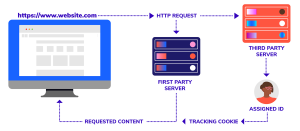The Death of the Third-party Cookie
By Anonymous | July 9, 2021
It’s a Sunday afternoon. You’re on your couch looking at a pair of sneakers on Nike.com but decide not to buy them because you already have a pair that’s slightly worn out. Then, you navigate to Facebook to catch-up on your friends’ lives. You scroll through various posts, some more interesting than others, and lo and behold, you see an ad for the same exact pair of sneakers that you just saw.
If you’ve ever wondered why this happens, it’s because of something called third-party cookies. These cookies allow information about your activity on one website to be used to target advertisements to you on another website.
What are third-party cookies?
A cookie is a small text file that your browser stores on your computer to keep track of your online activity. For example, when you’re shopping online, cookies store information about the items in your shopping cart. A third-party cookie is a cookie that was created by a website other than the one you are visiting. In this example, you’re visiting facebook.com but the cookie was created by nike.com.


What are third-party cookies used for?
They are primarily used for online advertising, so that ad companies can target advertisements towards specific users based on what they know about them.
Do all browsers support third-party cookies?
Two major browsers, Safari and Firefox, both block third-party cookies by default. Google Chrome, the most popular browser, still allows third-party cookies, but Google announced in Jan 2020 that Chrome would stop supporting them in the next few years.
Why is “the death of the third-party cookie” significant?
A large part of why browsers are no longer supporting third-party cookies is a change in public opinion. With incidents like Facebook’s Cambridge Analytica scandal, where a third-party company misused Facebook’s user data to manipulate voters, consumers have become increasingly aware and concerned about data privacy. Because targeted ads are so prevalent, it presents one of the biggest pain points. According to a poll conducted by the Pew Research Center, 72% of Americans worry that everything they do is being tracked by various parties, which is not too far from the truth.
The “death of the third-party cookie” means that advertisers will no longer be able to track users across different domains, such that the cookies created on a particular website can only affect the user’s experience on that site. This is called a first-party cookie. This means that it will be more difficult for an advertiser to develop a user profile based on your actions, given that they cannot consolidate your actions between various sites.
With third-party cookies going away, advertisers will be increasingly reliant on first-party data, data collected directly from the user (e.g. name, email, and viewed content) for targeting advertising. Hence, users will have to be more attentive to the data points that they willingly provide online and how they can be used.
Does this mean I should be less worried about ad tracking?
Yes and no. Although the phasing out of third-party cookies helps reduce privacy harms committed by Adtech firms, it also results in more power for companies like Facebook that not only have an immense amount of user data but also a large stake in the ad industry. New approaches to targeted advertising are already in the works as a replacement for third-party cookies, and it is yet to be seen how well these will guard user privacy.
References
* https://qz.com/2000490/the-death-of-third-party-cookies-will-reshape-digital-advertising/
* https://blog.hubspot.com/marketing/third-party-cookie-phase-out?toc-variant-a=
* https://www.mckinsey.com/business-functions/marketing-and-sales/our-insights/the-demise-of-third-party-cookies-and-identifiers
* https://www.epsilon.com/us/insights/trends/third-party-cookies
